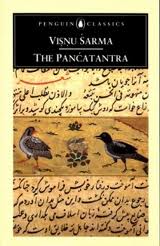
The Panchatantra is a collection of Indian fables, each fable taking the style of an allegory.The original text in Sanskrit is a mixture of prose and verse, with the stories contained in one of five frame stories. The introduction, which acts as an encompassing frame for the entire work, attributes the tales to a learned Brahmin called Vishnu Sharma, who used these stories to teach worldly wisdom to the three uninterested and dull-witted sons of a king.
Panchatantra means “five tantras” or ‘Five formulas’ and is divided into five sections of stories– “Loss of Friends,” “Winning of Friends,” “Crows and Owls,” “Loss of Gains,” and “Ill-considered Action.” The Panchatantra may have been written down as early as the second century BC, and numerous versions spread to Persia in the sixth century and to Europe during the middle ages. A German version in 1481, for example, was one of the earliest printed books.
Vishnu Sharma crafts a new world with the help of animal characters to create interest among his disciples and then uses a serialised, story-within-story approach to sustain it. He presents the means to achieve the the worldly wealth and pleasures. He extols the value of the worldly things unlike other fables like Jatakas.
But given the Hindu tradition of Kaama-Artha-Dharma-Mokasha (Desire, Money, Dharma and Salvation), and the to-be-king background of his disciples, he achives his goal in helping them to put their feet firmly first in the materialistic plane, thus laying the basic foundation for the young disciples to make their way up.
Written centuries ago and that too for youngsters, suprisingly, this book offers a lot to even to the grown ups in terms of understanding the human nature.
If you do not have the patience to read one of its English translations, you could always feast on the numerous Amar Chitra Katha comics.
Related links
Wikipedia
Panchantantra by Penguin
Amar Chitra Katha

